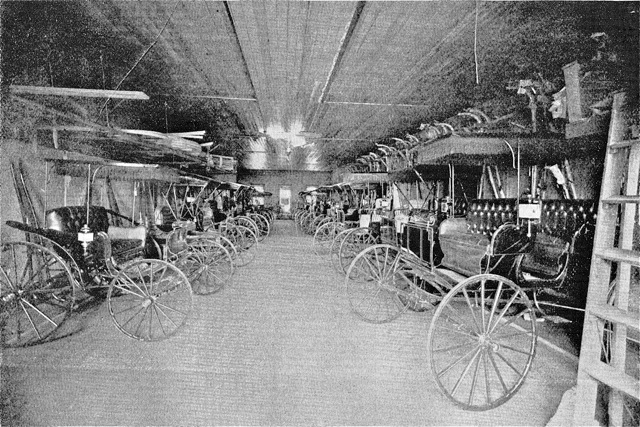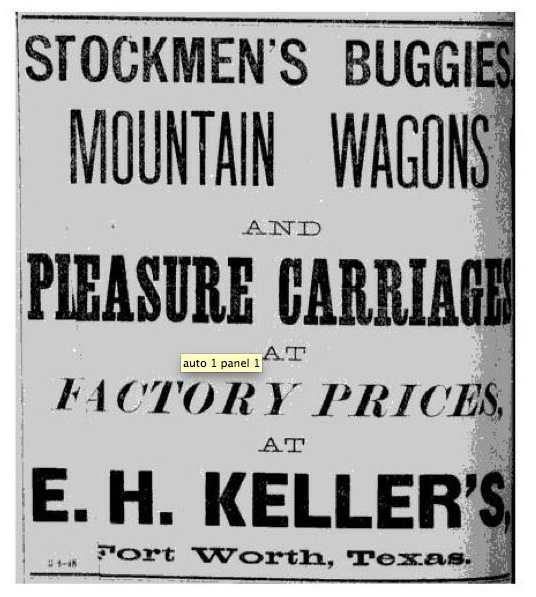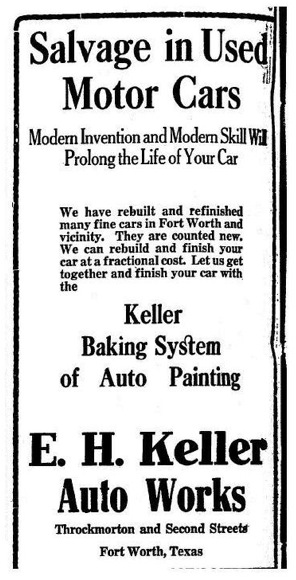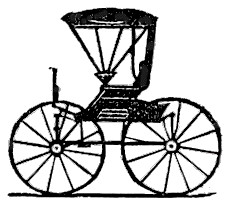 Ewald Henry Keller  The Denison City Directory for 1901 carried this listing: "Keller, Ewald H., carriages, buggies, phaetons, harness, saddles, 404 West Main ... Residence in Fort Worth, Texas. Benjamin F. Shepherd, manager." Some years later, a pictorial book, Industrial Denison, included a photograph with this caption: ""Depository No. 2, E. H. Keller." The 1900 Census listed Benjamin Franklin "Frank" Shepherd (1858–1943) as "merchant, buggies." He and his wife Eva lived at 700 West Gandy Street. These references suggest that Ewald Keller's Denison "repository" was a short-lived branch of his main business at his home city, Fort Worth.
The
Keller outlet at 404 West Main
Street perhaps was in operation as early as 1900 and closed before
1909, when
the photo was published. The 1907 Denison City Directory no longer
listed the
Keller business and indicated that Frank Shepherd had formed a
partnership with
Harry W. Lingo, "Lingo & Shepherd, broker." There
is no evidence that Ewald H.
Keller ever lived in Denison, but Shepherd spent most of his adult life
there,
as a merchandise broker, real estate agent, and insurance agent. Even
so, to
understand the significance of the Keller operation in Denison, it is
useful to
have some background about Ewald's life and his role in the changing
face of
transportation in this period in North Texas.
No
man of his age and
opportunities has had a more wonderfully successful career than has
Ewald H.
Keller, the prosperous carriage manufacturer of Fort Worth, Texas. He
was born in Texas, October 22,
1855. His father, Joseph Keller, was a native of Prussia, Germany, from
whence
he came to Texas, where he and his wife became the parents of two
children,
Ewald H. and Emma Ida. The Kellers were a prominent family in the old
country.
Several of Joseph Keller's relatives were officers of high rank in the
Prussian
army. Ewald
H. Keller had been attending
school only a short time when the Civil War broke out, and during the
war his
schooling was suspended, but, boy as he was, his pluck and energy
asserted
themselves, and he employed his time selling newspapers, often making
$25 a
week in this way. He spent two and a half years working in a bakery.
After that
he began learning the carriage and blacksmith trade under the
instruction of W.
H. Williams, of Galveston. There he served an apprenticeship of three
years,
paying all his expenses except board with money he had saved while
selling
papers. Then for one year he worked at the same place and received
small wages.
Having completed his trade, he started for Fort Worth via Dallas, and
from
Dallas he completed the journey on foot, his means being exhausted.
This was in
1873. Here he secured work at his trade, at one dollar a day, and
continued
thus employed one year, but as his salary was small he could save
nothing, so
he sold a bicycle he had traded for in Galveston, and with the money
thus
obtained left the town. Next
we find him at Calvert,
Texas, where he was employed by Gillam & Stanger until March
1875. He began
work for them at $2.50 per day, and was receiving $4 at the time he
left and
went to Austin. At Austin, however, the only position he could obtain
was at $7
per week, and after he had worked there a year he was discharged,
because the
proprietors said they did not want a boy who could do finer work than
they
could. At this juncture he resolved to try his fortunes in Fort Worth
again,
and accordingly came hither and resumed work for his old employer, Mr.
Williams, at $2.50 a day. He remained with him until 1876, when the
firm
failed, and he lost every dollar of his savings he had left in the
hands of his
employer. Again we find him stranded, but with courage undaunted. He
had
intended to go into business for himself had not his savings been lost. About
this time, a friend offered
him a position at Galveston as bookkeeper, at $75 per month. He replied
that
his desire was to go into business at Fort Worth. The friend asked the
sum
needed and was told that $75 would be sufficient. He sent him $100. Mr.
Keller
offered his note for the amount, but his friend refused to accept it,
saying
his word was enough. With this $100 he began business on the corner of
Tenth
and Main streets, where he purchased a lot of Captain A. M. Doggett for
$500,
on two years' time. With the cash on hand he purchased lumber to build
his
shop, hauling the lumber from Dallas with an ox team. The shop he built
was
twenty feet square. His first stock of material was purchased from
Wadsworth,
Griffith & Company, hardware dealers of Dallas, on sixty days'
time. He
himself carried the brick and mortar with which to build his forge, and
he gave
his note to the brick mason for doing the work. The sum was $7. His
promptness
and the quality of his work were his best advertisements, and his
business
prospered from the start. In 1884, on account of failing health, Mr. Keller sought a change of climate and went to California. He felt, however, that Fort Worth held his best prospects, so he returned to Texas in May, 1889, and leased the ground where he now does business. He now owns the lot, 100 x 120 feet, situated on the corner of Throckmorton and West Second streets, which is nearly covered with shops and storage rooms, the property being valued at $14,500. In 1890 he sold his first shop. That same year he began handling the Columbus buggies and carriages, and is now [1895] the only dealer in these celebrated vehicles at Fort Worth. Indeed, his establishment leads in the manufacture and sale of spring-wagons, buggies, carriages, harness, etc., at this place. He employs from thirteen to thirty-two hands in conducting his business.
During
his comparatively brief business
career, Mr. Keller has accumulated considerable property. He has an
elegant
residence on Second and Burnett streets, valued at $14,000, and owns
other
property, which he rents. He is president of the Mutual Building and
Loan
Association, a director in the Gazette Building and Loan Association,
and is
also a director in the Farmers' National Bank. In 1892 he attended the
Southern
Carriage Building Association, held at Atlanta, Georgia, and was chosen
second
vice president of the association. He is now first vice president. It
is his
desire to merge this organization into the National Carriage Builders'
Association, which he believes will be mutually beneficial. Mr. Keller is recognized in Fort Worth as one of the leading and influential citizens. His enterprise and energy, and well-known character [sic] for honesty and integrity have given him a reputation second to none in this city. Broad-minded and public-spirited, he is always found on the progressive side of all public questions, and is always ready to lend his aid and influence to all movements calculated in advance the interests of his adopted city.
Mr.
Keller was married March 24,
1880, to Miss Carrie M. Turner, daughter of Charles Turner, and a
granddaughter
of Captain E. M. Doggett. Her father was one of the first settlers of
Fort
Worth. They have three children: Carrie Ida, Emma Corinne, and Ewald
H., Jr. He
and his wife are members of the
Episcopal Church, and are liberal supporters of the same. He is a
prominent
Mason and a member of all the branches of Masonry, including Knights
Templar,
and is Captain General of Fort Worth Commandery, No. 19. He is also a
member of
the Knight and Ladies of Honor, and of the Sons of Herman. Source: History
of Texas, Together with a Biographical History of Tarrant and
Parker Counties (Chicago: The Lewis Publishing Company, 1895).
"As the nineteenth century ended, the story of five men is the story of Fort Worth—and of America in general.... [One of them,] Ewald Henry Keller had come to Fort Worth as a blacksmith in 1873. In 1876 he opened a stable. Then he began making carriages, wagons, and buggies.... By 1914 Ewald Henry Keller had converted his wagon works to an auto works, repairing, upholstering, and painting horseless carriages."
Source: Excerpt
from "Hometown by Handlebar," blog post called "Once Upon a
Flivver Fever (Part 1): Ramblers and Ropers," posted January 12, 2013.
Accessed at http://hometownbyhandlebar.com/?p=4650 * * * * * Singer of Rare Ability Miss
Carolyn Keller Wins Her McKinney Hearers Miss
Carolyn Keller [1883–1974],
who sang the bridal song at the
Clifton-Speight wedding here Wednesday afternoon, is a young singer of
rare
ability. She touched her listeners with her tender and sympathetic
interpretation of the song "All for You," and with the graceful swing
carolled out her deep, rich, limpid notes like another wood bird
calling to its
mate. Miss Keller looks toward artistic attainments and promises a rich
future.
She does her first concert work on Monday night next at Stephenville,
Texas. Concerning
her, the Fort Worth Record of a few
days since,
said: "Miss Carolyn Keller, daughter of Mr. and Mrs. E. H. Keller, is
one
of Fort Worth's most talented singers. After studying under Professor
David
Ross of Toronto, she took a two years' course under Saenger of New York
City
and expects to leave next month to resume her study under this great
artist." Miss
Keller has the distinguished
honor of being the singer of the evening at the banquet at the Oriental
Hotel
at Dallas, Oct. 21, given in honor of General Atterson of Nashville,
Tenn. [Source: Weekly
Democrat-Gazette
(McKinney, Tex.), October 31, 1907] 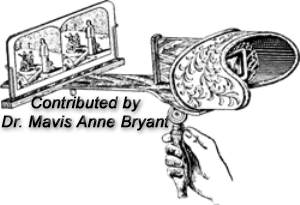 Biography Index Denison History
Susan Hawkins If you find any of Grayson CountyTXGenWeb links inoperable, please send me a message. |
